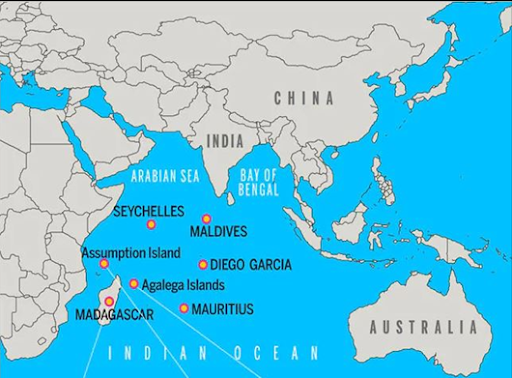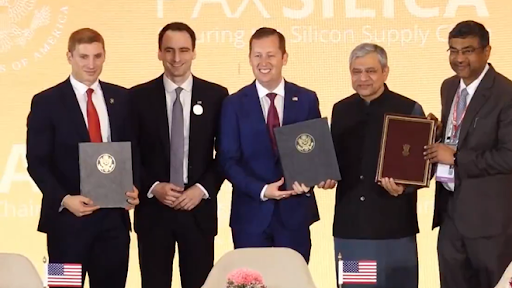



The Colombo Security Conclave, now a six-member grouping of India, Sri Lanka, Maldives, Mauritius, Bangladesh, and Seychelles, focuses on maritime security and transnational threats. Revived in 2020 from the earlier trilateral framework, it works through five pillars and operates with a permanent secretariat in Colombo.

Copyright infringement not intended
Picture Courtesy: THE HINDU
The 7th National Security Adviser (NSA) level meeting of the Colombo Security Conclave (CSC) was held in New Delhi.
It is a regional security grouping of Indian Ocean nations to promote cooperation on maritime security and address shared threats like terrorism, trafficking, and cybercrime.
It serves as a key platform for National Security Advisors (NSAs) of member countries to coordinate on regional security policy.
A permanent secretariat was established in Colombo, Sri Lanka, in 2024.
Evolution and Membership
|
Category |
Countries |
|
Full Members |
India, Sri Lanka, Maldives, Mauritius, Bangladesh, and Seychelles. |
|
Recent Guest Invitee |
Malaysia (participated for the first time in the 7th NSA meeting). |

The cooperation under the CSC is structured around five key pillars, which form the core agenda for its activities and joint initiatives.
Alignment with SAGAR Vision
The SAGAR (Security and Growth for All in the Region) policy positions India as a key net security provider in the Indian Ocean. The CSC, a concrete representation of this policy, strengthens economic and security ties with India's maritime neighbours.
Countering Extra-Regional Influence
The conclave acts as a regional security framework to counter the growing strategic influence of non-regional powers, like China, in the Indian Ocean, strengthening the strategic autonomy of smaller island nations.
First Responder and Capacity Building
It institutionalizes India as the regional 'first responder' in crises, offering a framework to build capacity, train, and share resources for enhancing neighbours' security capabilities.
Addressing Common Threats
It allows for a unified approach to transnational threats that no single country can address alone, such as maritime piracy, terrorism, and illegal, unreported, and unregulated (IUU) fishing.
Political Instability and Divergence
Domestic political shifts can alter member states' foreign policy, such as the Bangladesh' recent government change causing a foreign policy concern, creating uncertainty and challenging group cohesion.
Asymmetry in Capabilities
Disparity in the naval and coast guard capacities among members. India possesses a large and modern maritime force, while smaller island nations have limited resources, which affect the scale and complexity of joint initiatives.
China's Counter-Initiatives
China is building its own regional framework, excluding India, by launching parallel forums like the 'China-Indian Ocean Region Forum on Development Cooperation,' to reduce the influence of platforms such as the CSC.
Strengthen the Secretariat
Empower the Colombo-based secretariat with a dedicated budget and staff to effectively coordinate and monitor the implementation of projects.
Focus on Deliverables
Prioritize concrete outcomes, such as establishing joint training centers for maritime security, conducting regular operations, and creating a shared database for counter-terrorism intelligence.
Gradual Expansion
Future expansion of membership should be cautious and strategic, ensuring new members share the conclave's core values of a rules-based maritime order.
The Colombo Security Conclave is a vital, region-led, practical, and action-oriented security architecture that focuses on non-traditional threats and cooperation, aligning with India's strategic vision for a safer, more secure, and prosperous Indian Ocean Region.
Source: THE HINDU
|
PRACTICE QUESTION Q. What is the Colombo Security Conclave (CSC)? Analyze its significance for India's maritime security interests and its 'Neighborhood First' policy in the Indian Ocean Region. 150 words |
The Colombo Security Conclave is a security grouping of Six Indian Ocean nations: India, Sri Lanka, Maldives, Mauritius, Bangladesh and Seychelles. It focuses on enhancing regional cooperation on maritime security and addressing non-traditional security threats like terrorism, trafficking, and cyber-attacks.
The CSC's cooperative framework is built upon five key pillars:
The CSC is a direct implementation of India's 'Security and Growth for All in the Region' (SAGAR) vision. It strengthens the 'Neighbourhood First' policy by fostering trust and collaborative security with immediate maritime neighbours. It also helps India assert its role as a 'net security provider' in the Indian Ocean Region.




© 2026 iasgyan. All right reserved